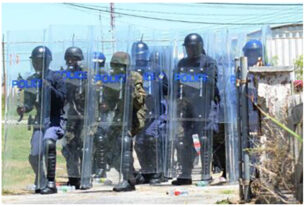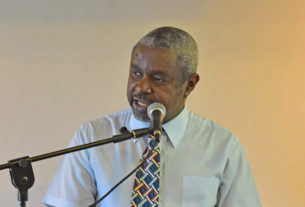By Stabroek News September 13, 2020
With preparations underway to facilitate a state visit by the United States’ Secretary of State Michael Pompeo to Guyana this week, the Irfaan Ali administration has been urged to make its position known on non-negotiable elements with respect to Venezuela.
Sunday Stabroek has learnt from well-placed sources that Pompeo is expected to be in Guyana from September 17 to September 18. He would be the highest-ranked US government official to visit Guyana in decades.
Permanent Secretary of the Foreign Ministry Ambassador Audrey Waddell yesterday confirmed that a visit is expected but indicated that details as to the purpose of the visit are not yet available. “The government will issue a press statement when the information is available,” Waddell said.
A spokesperson for the US Embassy in Guyana also indicated that “there is no announcement” in relation to the visit.
Minister of Parliamentary Affairs and Govenance Gail Teixeira, however, described the scheduled visit as “important and significant.”
“Especially in light of what has happened over the five months and the US government’s support to Guyana during that time this visit is important,” the minister stressed while explaining that she was unaware of whether it was a trip to the Caribbean and Latin America region or to Guyana alone.
The last time Pompeo visited the Caribbean region – in January – he ran afoul of then Chair of the Caribbean Community (CARICOM) Mia Mottley for failing to engage with all of CARICOM.
“As Chairman of CARICOM, it is impossible for me to agree that my Foreign Minister should attend a meeting to which members of CARICOM are not invited,” Mottley said at the time while suggesting that it would be an attempt at divide and rule among CARICOM countries “if some are invited and not all”.
Over the last month, Pompeo has been touring the world in what the Associated Press has described as an attempt to burnish the foreign policy credentials of President Donald Trump ahead of November’s presidential election.
He was most recently in Qatar, where the negotiating teams of the Taliban and the Afghan government have begun hammering out a road map for a post-war Afghanistan. These negotiations follow a peace deal the United Sates and the Taliban signed in February in Qatar’s capital of Doha.
In this region, the US government has been trying to drum up support against the Venezuelan government led by Nicholas Maduro.
Ahead of planned parliamentary elections in that country, Pompeo announced sanctions against four individuals he claimed were conspiring against free and fair elections. These include Indira Alfonso and Jose Gutierrez, who were appointed earlier this year by the pro-government Supreme Court to oversee the national electoral council, which has called elections for this December.
Pompeo had also been very vocal during the five-month long delay in the finalisation of Guyana’s general and regional elections process. His voice was one of the loudest calling for the APNU+AFC coalition to concede and allow for the Irfaan Ali to be sworn in as president.
Ali was sworn in on August 2 and two weeks after the United States’ Assistant Secretary of State Michael Kozak publicly thanked this country for supporting a Lima Group statement which, among other things, reiterated a firm commitment to Venezuela’s Juan Guaidó, who was referred to as interim president, and rejected “the illegitimate regime’s announcement it would hold parliamentary elections without the minimum guarantees and without the participation of all political forces.”
“Great to see Guyana adds its voice for the call to restore democracy in Venezuela. The US encourages all democratic countries to commit to helping the Venezuelan people achieve a peaceful, prosperous and democratic future,” Kozak had Tweeted.
Guyana, however, is not listed as one of the countries which signed the joint statement that was issued and no member of the Guyana government has acknowledged its contents.
This action has been seen by some as an attempt by the US government to steer Guyana’s foreign policy position on Venezuela.
‘Non negotiables’
A statement issued by the Guyana Human Rights Association (GHRA) yesterday urged government “to make public, well in advance of the visit, what are the non-negotiable elements with respect to Venezuela” and “avoid any recklessness devised to interfere with electoral matters.”
Reminding that Guyana, in the context of the border controversy with Venezue-la, has studiously avoided making any statement or taking any position on the domestic political situation in Venezuela, the GHRA stressed that “any attempt to entangle Guyana in other political initiatives which undermine Guy-ana’s position on the border dispute must not be entertained under any circumstances.
“Aligning Guyana with those seeking regime change not only threatens Guyana’s legal negotiations over the border, but it would also be politically absurd, since the current US candidate to replace the incumbent President of Venezuela is among the leaders of those supporting the illegal claim on Guyana’s territory,” it said, while adding that Guyana has also continued to resist efforts in recent years to be included in the many multi-national initiatives aimed at regime change in Venezuela.
All-party unity on the Venezuelan issue has been a feature of Guyanese politics over many administrations, the GHRA reminded.
“This tradition survived recent inter-party tensions with the new administration retaining the services of several senior members of the previous administration in the Ministry of Foreign Affairs responsible for negotiation on the border issue… the inclusion of Guyana’s name in the State Department list of countries supposedly calling for democratic change [therefore] poses serious problems,” it noted.
The GHRA further noted that there is an expectation in the international community that the Trump administration will attempt an “October surprise” ahead of the November elections.
The October surprise in American politics is a news event deliberately created or timed to influence the outcome of US presidential elections.
The GHRA explained that economic and military pressure along with covert operations and disinformation campaigns in Vene-zuela have been reported, involving Colombian and Brazilian military.
Some form of invasion or uprising has not been ruled out, it said, before reminding that self-determination of Guyana as a State is a matter of fundamental human rights, as indeed, is that of Venezuela.
FIRST APPEARED By Stabroek News September 13, 2020




